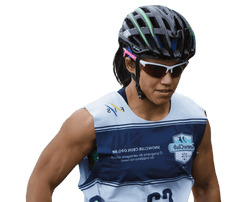Menu

asketball, uSA
Season 3
5
1
When Aline was 15 years old, she was in a car accident that paralyzed her from the waist down. That said, she says “sport changed my life, not the accident.” According to Aline sport gave her wings, the ability to travel, and to meet people from all over the world.

In this episode, we speak with Brazilian Paralympic cross-country skier, Aline Roche about her passion for sport, and what it’s like to be the only female para cross country skier from all of South America competing in the 2022 Winter Games. As a former Flag Bearer for her nation and someone who has competed in both the Summer and Winter Paralympics, we also discuss what it’s like to be disabled in Brazil and her hopes for women in para sports for the future.
Contributing expert include Fernando Orso (Aline’s Coach and Husband), Dr. Mônica da Silva Araujo (PhD in Anthropology and Professor, Department of Social Sciences, Federal University of Piauí, Brazil)
This episode was made possible by Michael Cerqueria. Thank you for your translation help, Michael!
In Tokyo2020, Chelsea was Guyana’s first-ever table tennis Olympian and her nation’s flagbearer, so as she heads into her second Olympics, she’s coming in with high hopes…and a lot of eyes on her. That said, her path to Paris has focused on “re-finding the joy of table tennis.” After Tokyo, things changed. People started treating her differently and everyone felt entitled to weigh in on her matches, so for the last several years, Chelsea has focused on grounding and surrounding herself with people who lift her up, not tear her down. She shares, “You have to be really mindful of the people you have around you.”
In today’s interview, we discuss how Chelsea first found table tennis (hint: it was an accident), and we explore the other aspects of her life outside of sport. She’s a self-described couch potato, nerd, rubik’s cube aficianadao, beach lover, and so much more. As she looks to the future, she hopes to continue to build the sports infrastructure of her home country, Guyana. Our money is on Chelsea to do whatever she sets her mind to!
Marta was the “little Chinese” girl, but when she found track, she was better than everyone (including the guys), so she became “the fast girl.” According to Marta, running was what made her different and special. “When you find something that you can hold onto, you’re going to show off your superpower.” For Marta, that was running.
Marta grew up speaking Portuguese, with a Portuguese name, eating Portuguese food, living in Portuguese culture, yet her Mom spoke Chinese and was from a different culture. This was a challenge. According to Marta, “When I was a kid, all I wanted was to be the same. And now I want to embrace everything that is a part of me…I wish I was more different.”
Today’s episode focuses on identity, and how Marta has evolved from wanting to blend in to wanting to express her full self. We talk about how she found track, her work ethic, and hopes for the future of women’s sport.
Marzieh, the daughter of two Afghan parents, grew up as a refugee in Iran. “They treated us differently” she shares, which eventually led her family to move back home to Afghanistan. In her home country, Marzieh joined the Taekwondo national team and quickly climbed the ranks, where she remained until the 2021 Taliban takeover. That’s when everything changed…
Women can no longer go to school, the gym, or even outside without a male chaperone. As Marzieh shares, “The Taliban told me not to come back to the gym and if I did, they would do what they wanted with me.”
She had to flee the country and has since lived in France, where once again, she’s a refugee. Despite settling into a new country, home is always on her mind; “I have to use my freedom to talk about Afghan women…Nobody will kill me here if I talk about the Taliban and the problems.” So that’s what she’s doing. In today’s episode, Marzieh shares what she wants the world to know about Afghan women (+ shares three asks below).
As Marzieh looks to the future, she’s not going to sugar coat things. Right now, no she’s not hopeful for the future of Afghan women, but she shares that “after the dark, always comes light.”
Marzieh has three asks of you:
1. Write about Afghan women in your social media. Flame Bearers has graphics that you can share to support Marzieh and other Afghan women. DM us and we will share so you can post.
2. Donate to nonprofits working on the ground in Afghanistan. A few organizations to consider: World Food Program, International Rescue Committee, and Save the Children
3. If you’re in a position to hire, employ or support a refugee in your community, do so.
Copyright @2024 Flamebearers Marketed and Designed by Bullzeye Media